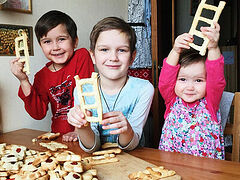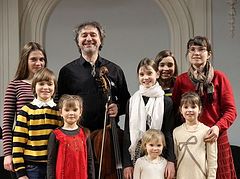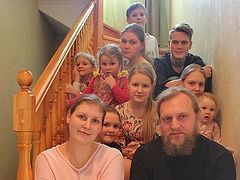The first thing that strikes the many guests who enter the Savchuks’ house is the silence. It’s quite unexpected—there are nine children in Fr. Anatoly’s family, so one expects to find shouting, crying and commotion. But a benign and somehow creative silence reigns there. “Anything can happen, especially on holidays,” the priest smiles. “But this is how we usually live. Everyone has their own activities appropriate for their age, and it is best to do them calmly, without any fuss. We can make some noise for you if you’d like, but do you really need it?"
No, I definitely don’t need it. It was in search of a quiet conversation that came to the home of the hospitable Savchuks in the town of Kharovsk of the Vologda region. A huge dining table indicates that their large family always gathers around it for a meal. It seems this handmade table is always filled with food.
 Priest Anatoly Savchuk with children
Priest Anatoly Savchuk with children
Unwelcome authorities
Jokes aside, it’s a serious matter. It’s not a childish affair, although it is connected with children. I have spent time talking here with a person who knows how to build a home where peace and order reign, where there is a desire to help each other, the ability to overcome trials together—at school, work or those related to age. For if a man know not how to rule his own house, how shall he take care of the Church of God? (1 Tim. 3:5).
—Father, you have nine children.
—Yes, the oldest is twenty, the youngest is three.
—We have only three. Now our kids are growing up with the inevitable changes in their character, views and intentions. They are saying goodbye to their kind, pure childhood and entering a dangerous big world, where neither the people around them, nor the children themselves, nor even we, their parents, seem so innocent. Do you think there’s something sad about a child growing up?
—Yes, it’s hard. Our former angels move away from their parents, they seek our advice less often and some disconnectedness arises. There are age-related reasons, along with new trends that damage family relationships. Take the issue of “gadgets” — the question is complex, and it seems that everyone faces it and has to find a way to deal with it. A lot depends on the parents: how the issue is resolved, whether they find a good solution. The problem is not new—it has always existed.
—The child’s perception of who is an authority changes, adolescent nonconformity appears, and the parents cease to be the last resort. The so-called “authority” is often found among classmates or elsewhere—anyone but the parents can be an authority. And parents aren’t always enthusiastic about these “authorities”.
—It’s a pity that children don’t understand whom they can really trust. I can judge myself, my own family. Parents have experience. They have lived long lives. If the father is a priest, it makes sense to consult with him and heed his advice. The specificity of his ministry is that he sees the lives of different people. It’s his everyday experience—both his own and that of the thousands of people he speaks with.
—He has more experience if he is a sincere priest. He’s like a walking encyclopedia of ethics and family psychology.
—Yes. And who knows whose experience our children rely on. Some social media authority tells them something and they believe it as if it were a Biblical revelation, a discovery. As a rule, those online “advisers” have specific goals: to create estrangement.
—So we can posit that these individuals in whom our growing children put their trust more than us, aren’t always motivated by what’s best for our children.
—Whom they trust is very important. So, dad is an old fogey, it’s obvious in advance what he’s going to say and what advice he’s going to give. But what about dad’s friend, for example? We know him very well. They played bingo with him, went sledding with him, still laugh at his jokes and look forward to his visits. He is a welcome guest for mom and an authority for dad. And what about this blogger? What motivates him? Is it a kind and altruistic attitude towards the child, or a desire to prove himself at the child’s expense, or something worse?
Children are captivated by laughter as they watch a car crash into a pole and then a wall... This is “cool.” And since it’s cool, kids listen to these pranksters.
Be... god for a time
—On one hand, this is developmental psychology. The eternal parent-child conflict. But apprehension and fear, as you’ve said, often cause children to choose the “authority” of people an adult would never believe. Is this experience necessary for our children? Perhaps they have to plunge into the mud in order to understand what cleanliness is?
—It’s hard to say. A person wounds himself by doing that. And there are irremediable wounds, too. Okay, so you have boils, that’s curable. But if you lose a leg, it won’t grow back.
—See then that ye walk circumspectly (Eph. 5:15)?
—Yes. This applies to both adults and children who know how to read. It obliges us to mobilize our strength and trust in God. There should be joint trust in God, yours and your child’s. We must understand that the main authority for us is not a crook from the internet or a back street, but Christ. May God grant that we help children understand this. We need them to know that, okay, you have such quirks today, but please don’t think that the purpose of life is in them.
— Regarding strictness. If I erect a wall of Bibles around the school and those same back streets, forbidding my kids to go anywhere, taking away their freedom—is this a way out? If what they see at every step are barriers I’ve created, then the father they see will have the visage of an SS officer. Although I’d limit children’s use of technology.
—There’s reasonable strictness, and there’s obtuse strictness. The former is needed within acceptable limits, and you must explain the reason for your strictness to your children. “If you behave like this, it’s fraught with serious consequences.” Of course, they may not listen. But it’s our duty to warn of the consequences.
—Without imposing my opinion, humbly admitting that my authority, my importance is no longer as great as it was before, I acknowledge your right to take my words not as an order, but as advice. Is that what you mean?
—Just so. The child will act as he sees fit, but it is important that the child feels kindness towards himself, and not this SS officer’s glare. Our business is to remain patient and loving fathers. I read that recently in a book.
 —To my horror, I often see my childrens’ sins in myself, as if they put a mirror in front of me. I see the things I plunged myself into from the time I started to read, the things I want to protect my kids from. When you see sins and your kid’s inclination towards them, it’s very painful. How can one not get discouraged? Am I right that this is a consequence of my sins, or does it have to do with the corruption of man?
—To my horror, I often see my childrens’ sins in myself, as if they put a mirror in front of me. I see the things I plunged myself into from the time I started to read, the things I want to protect my kids from. When you see sins and your kid’s inclination towards them, it’s very painful. How can one not get discouraged? Am I right that this is a consequence of my sins, or does it have to do with the corruption of man?
—It’s hard to say regarding your personal or general corruption. Everyone has his own virtues, his own sins. To avoid becoming disheartened, we have the Parable of the Prodigal Son, revealing God’s attitude towards us. The father didn’t try to persuade his son, “Don’t go! You’ll waste your money! Come back, I’ll forgive everything! Stay at all costs!” He was wise and loving, and he went out on the road and waited. Knowing his youngest son, he let him go.
—He knew that plunging into muddy water would help him return sincerely?
—Maybe he understood that there was no way for him to explain it. Sometimes a person can’t hear you, no matter how much you shout.
—There are people who say to God, “Thy will be done,” and there are those to whom God says, “Let your will be done.”
—Perhaps. If you don’t want to listen to someone else’s experience, go get your own.
—We parents, who are far from sinless but see our children suffering, have an opportunity to play the role of the wise father from the parable?
—Wise and loving. And not only should the child work on the Gospel, but we should too. Our responsibility doesn’t stop when the child grows up. It just moves on to another level and stage. People often complain about God. But try to be a god, even on a microscopic scale. How does God feel when He looks at us? He is a loving Father. How many of us does He have? Eight billion children! Try to understand Him via your own microscopic example, without daring to violate human freedom.
—Can Christ not weep in this case?
—Exactly. Try it. We grieve Him greatly. Every parent has this opportunity, to be a “god” for a time.
Eternal youth
—What good does our children’s maturity reveal to us?
—If parents succeed in implanting good qualities in their children, they’ll see the fruits: patience, mercy, care.
—And when does that take place?
—It depends. A friend of mine told me that when he was a child he was taught this way: “We feed you until you are fifteen, and then you take care of us.” So he gave the first salary to his mom, and since then he has always supported his parents. What do you think, did they manage to implant good feelings in him?
—It’s like a good gardener: If he works conscientiously, he enjoys not only watching his tree grow, but also seeing and eating its fruit. Albeit not without all sorts of struggles.
—But there will definitely be fruit.
—Why is it good when a family has many children? I have the impression that childhood in your family doesn’t stop, as it were. What’s so good about a big family?
—Indeed, it doesn’t stop. My friends who have one child are filled with joy when their grandchildren are brought to them! They live in anticipation. And I always have a three-year-old with me. By the age of forty, people have a different attitude towards children, beginning to understand them truly, without egotism.
—Forever young Father Anatoly!
—In some sense, yes. The children keep me in shape. I can’t just lay down on the couch and relax.
Suffering as a Condition of Joy
—Time flies quickly as we make plans for a happy life: an apartment, a car, a holiday cottage, travelling... “Happiness” doesn’t come, however. How can we be happy?
—Every day there is a reason to be happy about something. I heard a ninety-year-old woman’s confession; she radiated happiness—not a single word of annoyance, condemnation or anger. She was happy that there was no war—so many years after the war ended! I recall the words of St. Seraphim of Sarov, “Acquire the spirit of peace, and thousands around you will be saved.” I remember my grandmothers saying, “There is bread, there is no war. What else do we need?” It’s like we are sitting in the sunlight, but for some reason we are looking for a light switch...
Let’s say a man is building a house and thinking, “Once I build it, happiness will come!” But when the house is finished, he understands that the happiest period was when the construction was going on because he anticipated it with enthusiasm. It’s a creative process. We are creators, at least we’re called to be. This applies to children as well. They shouldn’t be obsessed with plans for the future: each period (including the difficult school and college years) has its own unique joy and light.
—I recall the observation of C.S. Lewis, “It is the stupidest children who are most childish and the stupidest grown-ups who are most grown-up.”1
—By nature, children strive to be adults.
—And we relapse into childhood?
—A wise adult appreciates some of the qualities of children: simplicity, spontaneity, guilelessness. As it is said, “the elderly are like children.”
—Is this in reference to powerlessness?
—It’s about wisdom and the fruits we discussed. A person lives to an old age, acts according to the Gospel and fulfills the commandment to become as little children (Mt. 18:3). Children’s ingenuousness, guilelessness, joy—in old people these are powerfully present. I mean those who have lived according to the Gospel, and not those who have senile dementia.
 Fr. Anatoly at the Church of St. Seraphim of Sarov in Kharovsk —Can we say that in children this joy is sincere, albeit on an unconscious level, while in old people the words “my joy,” spoken by St. Seraphim refer to conscious joy acquired through suffering?
Fr. Anatoly at the Church of St. Seraphim of Sarov in Kharovsk —Can we say that in children this joy is sincere, albeit on an unconscious level, while in old people the words “my joy,” spoken by St. Seraphim refer to conscious joy acquired through suffering?
—Yes, indeed acquired through suffering. And experience is necessary. A person can try out the ephemeral happiness that civilization offers him and will understand that this is complete nonsense.
—I’ve heard the phrase, “An idle youth—a foolish old age.” Have you heard this?
—Yes, it’s a terrible, depressing sight when you see an old man who only remembers his “feats,” which he can no longer repeat because of his physical weakness. He wants to, but he can’t. Those eyes, they’re scary. He doesn’t want to step back from this and probably understands that if he admits that his life has been lived in vain, it will lead to an abyss of despair.
—The fear (or horror) of the fear of God.
—The horror. Good fear can be salvific, take the Penitent Thief as an example. But the horror at the fear of God is fruitless and destructive.
—Back to our children: They teach us humility, which also allows us to feel what it’s like to be a god.
— With a lowercase “g.”
—We can better understand our sinfulness. The point is not in recollecting our past sins, but in realizing that we are sinners.
—Imagine you’ve been given a blank sheet of paper. You could have turned it into a masterpiece, but instead what you have are some scribbles. Isn’t that a reason for humility?
Simple exploits in modern Russia
—What shall we do with this baggage? How do we avoid despair?
—A parent’s prayer has a great power. A mother’s prayer can retrieve a child from the abyss. A father’s too. Let’s not underestimate the significance of prayer, and of our own prayer. Trust in God, yes, but be kind and make an effort too. Prayer is work, it’s part of raising children. You accomplish a podvig when you pray sincerely, seriously, offering your sacrifice to God. Not the quantity, but the quality of prayer matters. You can breathe out during the day, “Lord, help my children not do foolish things, save them.”
Then good deeds. Alms doth deliver from death, and shall purge away all sin (Tob. 12:9). I am the Lord thy God… shewing mercy unto thousands of them that love Me, and keep My commandments (Ex. 20:2, 6). If there is someone in the family who tries to live righteously, the Lord will have mercy on his relatives for his good life. The… prayer of a righteous man availeth much (Jm. 5:16). As for good works, I wouldn’t give up on people, whether young or old. In our forests on the shore of the lake, there is a huge church of Sts. Florus and Laurus—it stands on the ancient route along which Mikhail Lomonosov walked to Moscow. The church is similar in size to St. Sophia’s Cathedral in Vologda or the Holy Trinity Cathedral in Pskov. It was neglected in the Soviet era and it’s good that it was not destroyed. We began to restore it quietly. Seeing the size of the building, the workers we wanted to hire refused the job and didn’t even ask the price. Guess who has made the scaffolding? Two twenty-two-year-old guys from Vologda. They said they just wanted to do God’s work and not go crazy from unemployment. If you look at their work, you will understand that real Russian craft and industriousness haven’t disappeared. An elderly woman of seventy did all the plasterwork and whitewashing. She said that she was praying for her son who had a drinking problem, so she had promised Christ to perform this labor for him. That’s strong, right? When some say that everything is gone forever, I am in no hurry to succumb to panic: Holy Russia is still alive. There is ample evidence to prove this.
 Church of Sts. Florus and Laurus in the village of Kumzero, the Kharovsk district
Church of Sts. Florus and Laurus in the village of Kumzero, the Kharovsk district




